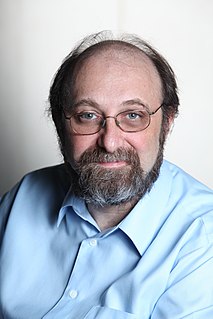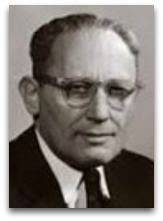A Quote by Fei-Fei Li
Just like the brain consists of billions of highly connected neurons, a basic operating unit in a neural network is a neuron-like node. It takes input from other nodes and sends output to others.
Related Quotes
In my view, while the single neuron is the basic anatomical and information processing-signaling unit of the brain, it is not capable of generating behaviors and, ultimately, thinking. Instead, the true functional unit of the central nervous system is a population of neurons, or neural ensembles or cell assemblies.
The well-being of a neuron depends on its ability to communicate with other neurons. Studies have shown that electrical and chemical stimulation from both a neuron's inputs and its targets support vital cellular processes. Neurons unable to connect effectively with other neurons atrophy. Useless, an abandoned neuron will die.
There are 100 billion neurons in the adult human brain, and each neuron makes something like 1,000 to 10,000 contacts with other neurons in the brain. Based on this, people have calculated that the number of permutations and combinations of brain activity exceeds the number of elementary particles in the universe.
A true community consists of individuals - not mere species members, not couples - respecting each others individuality and privacy while at the same time interacting with each other mentally and emotionally - free spirits in free relation to each other - and co-operating with each other to achieve common ends. Traditionalists say the basic unit of "society" is the family; "hippies" say the tribe; noone says the individual.
Shaped a little like a loaf of French country bread, our brain is a crowded chemistry lab, bustling with nonstop neural conversations.Imagine the brain, that shiny mound of being, that mouse-gray parliament of cells, that dream factory, that petit tyrant inside a ball of bone, that huddle of neurons calling all the plays, that little everywhere, that fickle pleasuredome, that wrinkled wardrobe of selves stuffed into the skull like too many clothes into a gym bag.
The structure of the human brain is enormously complex. It contains about 10 billion nerve cells (neurons), which are interlinked in a vast network through 1,000 billion junctions (synapses). The whole brain can be divided into subsections, or sub-networks, which communicate with each other in a network fashion. All this results in intricate patterns of intertwined webs, networks of nesting within larger networks.
Today, when we look at a brain, we see an intricate network of billions of neurons in constant, crackling communication, a chemical labyrinth that senses the world outside and within, produces love and sorrow, keeps our hearts beating and lungs breathing, composes our thoughts, and constructs our consciousness.





































